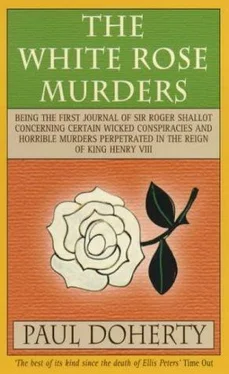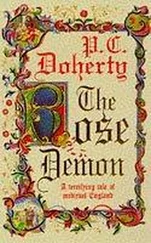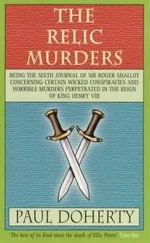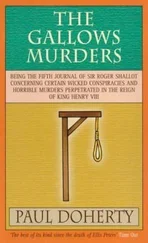Paul Doherty - The White Rose murders
Здесь есть возможность читать онлайн «Paul Doherty - The White Rose murders» весь текст электронной книги совершенно бесплатно (целиком полную версию без сокращений). В некоторых случаях можно слушать аудио, скачать через торрент в формате fb2 и присутствует краткое содержание. Жанр: Исторический детектив, на английском языке. Описание произведения, (предисловие) а так же отзывы посетителей доступны на портале библиотеки ЛибКат.
- Название:The White Rose murders
- Автор:
- Жанр:
- Год:неизвестен
- ISBN:нет данных
- Рейтинг книги:4 / 5. Голосов: 1
-
Избранное:Добавить в избранное
- Отзывы:
-
Ваша оценка:
- 80
- 1
- 2
- 3
- 4
- 5
The White Rose murders: краткое содержание, описание и аннотация
Предлагаем к чтению аннотацию, описание, краткое содержание или предисловие (зависит от того, что написал сам автор книги «The White Rose murders»). Если вы не нашли необходимую информацию о книге — напишите в комментариях, мы постараемся отыскать её.
The White Rose murders — читать онлайн бесплатно полную книгу (весь текст) целиком
Ниже представлен текст книги, разбитый по страницам. Система сохранения места последней прочитанной страницы, позволяет с удобством читать онлайн бесплатно книгу «The White Rose murders», без необходимости каждый раз заново искать на чём Вы остановились. Поставьте закладку, и сможете в любой момент перейти на страницу, на которой закончили чтение.
Интервал:
Закладка:
Strange, isn't it, that even then the great mysteries of Flodden Field came south, like a mist, and changed my life? I didn't know it then. All I knew was that while King Henry VIII was in France, James IV of Scotland had sent his herald RougeCroix south with an insulting challenge to battle. Henry's Queen, the sallow-faced, lanky Catherine of Aragon, pining for her husband and longing to provide him with a lusty heir, accepted the challenge and sent insolent-eyed Surrey north with a huge army. Now old Surrey was a bastard. He drank so much the gout stopped him walking and he rode like a farmer in a cart, his orders being taken by outriders and scouts. A vicious man, Surrey, but a good general. You know, as a young man, he and his father Jack, the 'Jockey of Norfolk', fought for the Usurper Richard at Bosworth. Old Norfolk was killed and Surrey taken prisoner before Henry Tudor.
'You fought against your King!' the Welshman shouted.
Surrey pointed to a fence post.
'If Parliament crowned that fence King, I'd fight for it!' he bellowed back.
The Tudor prince seemed to relish this. Surrey went to the Tower for a while but was soon released because of his qualities as a general. He kept good discipline on that march to Flodden: he built a huge cart which carried a thirty-foot-high gallows, loudly declaring that if anyone committed a breach of camp discipline he would dance at the end of it.
Anyway I went north to meet my destiny. The dust of our great baggage train, stirred up by wheels, feet and hooves, hung above our forest of lances, almost obscuring the late summer's sun which struck bright sparks from halberd, sword and shield. In the front, old Surrey in his cart, his yellow hair now white, his ageing body held straight in its cuirass of steel. Behind him, my goodself among the bowmen in deerskin jacket and iron helmet.
Most of us were pressed men: gaol birds, night hawks, roaring boys. I have never seen so many evil-looking villains together in one place. We were armed with white bows six feet long, cunningly made from yew, ash or elm and strung with hemp, flax or silk. We had deep quivers full of cloth-yard arrows of oak, tipped with burnished steel and ringed with feathers of goose and swan. During the day the air was thick with the hum of flies and sour with the stench of marching men. At night we froze or shivered in our rough bothies of hay and wood and we cursed the Scots, Surrey and our hard-mouthed captains who urged us on.
We reached the Scottish Marches and crossed into a land rich in fish, wildfowl, deer, dark woods and great flocks of sheep grazing on bottle-green pastures which ringed shimmering lochs. (I won't keep you long.) Old Surrey met James at Flodden Field on Thursday, 8 September. We deployed our cavalry, massed in squadrons of shining helms and hauberks. I remember the creaking harness of our great war horses, the bannered lances and emblazoned shields. James, of course, wanted a set piece battle but Surrey's reply was sharp and caustic.
'I have brought you to the ring, dance if you can!'
The bloody dance began on Friday morning with the Scots massing on Flodden Ridge. All day we stood to arms. I was terrified. We saw thick smoke as the Scots burnt their camp refuse and a stormy wind blew the smoke down on us. James used this haze as a screen to launch his attack two hours before sunset. First, a steady flow of lowered spears down the slope which soon became a landslide of barefoot men across the rain-soaked grass. Thankfully, I was on the wings for the centre became a bloody slaughter house. The Scottish squadrons floundered in the marshy ground, mowed down by arrows which dropped upon them like rattling rain until the grassy slope became russet and strewn with quilled bodies. The screaming and the shouting was too much for me, especially as a squadron of Scottish cavalry, maddened to fury, charged our position. I suddenly remembered valour has its own day, dropped my bow and fled. I hid beneath a wagon until the slaughter had finished and came out with the rest of the English Army to claim a great victory.
God, it was a shambles! Scots dead carpeted the entire field. We heard that James IV was killed. Indeed, Catherine of Aragon sent the corpse's bloody surcoat to her husband in France as proof of her great victory. She should never have done that! Bluff King Hal saw himself as a new Agamemnon and did not relish his wife reaping victories whilst he charged like an ass around Tournai. Men say Catherine of Aragon lost her husband because of the dark eyes and sweet duckies of Anne Boleyn. I know different. Catherine lost Henry when she won the victory at Flodden Field – but that was in the future, mine as well as hers. Little did I know, as we marched back to London, how the ghosts of Flodden Field would follow me south.
The army was disbanded and, after tasting the delights of London, I decided to return to Ipswich. I came home, a Hector from the wars. I even nicked my face with a knife to give myself a martial air. This brought me many a meal and rich frothing tankards of ale but they all tasted sour for my mother was dead. She had gone the previous summer – silently, as in life, without much fuss. I went to the cemetery, through the old wicket gate, down to where she would sleep for all eternity beneath the overhanging sombre yew trees. I knelt by her grave and, on one of those rare occasions in my life, let the hot tears run scalding down my cheeks as I begged for her forgiveness and cursed my own villainy.
My step-father was a mere wisp of what he had been, broken in spirit, shuffling and stumbling round his house like a ghost. He told me the truth: how mother had been ill of some abscess in her stomach which had bled, turning malignant, but there had been hope. Hope, he sighed, his eyes pink-rimmed, the tears pouring down his sagging cheeks; hope which died when the physician, John Scawsby, arrived on the scene. Now Scawsby was a well-known doctor and a man of repute. In fact, he was a charlatan, responsible for more deaths than the town's headsman. He had concocted some rare potions and strange elixirs for my mother but the situation had worsened and within weeks she was dead. A wise woman, a herbalist who dressed her corpse, said the malignancy had not killed her but Scawsby's elixirs had. My stepfather could do nothing but I lurked in the taprooms of Ipswich, plotting my revenge.
I studied Scawsby most closely: his great black-and-white-timbered mansion which stood on the edge of town; his stables full of plump-haunched horses; his silken sarcenet robes; his ostentatious wealth and sloe-eyed, honey-mouthed, tight-waisted young wife. One day I struck, plunging for Scawsby as sure and as certain as a hawk on its prey. Scawsby used to like to dine at the Golden Turk, a great tavern which fronts the cobbled market square in Ipswich. He was a lean, sour-faced, avaricious man who liked to gobble his food and slurp his wines. He had not read his Chaucer or remembered the Pardoner's words, 'Avarice is the root of all evil', and I played on this. I dressed in my finest: a shirt of sheer lawn with embroidered bands at neck and cuffs, a doublet of rich red samite, dark velvet hose and a cloak of pure red wool. I also borrowed from my step-father a costly bracelet encrusted with precious stones very similar to one Scawsby wore.
At noon on the appointed day, I entered the Golden Turk, and espied Scawsby and a friend sitting beneath the open window conversing deeply, as men full of their own self-importance are wont to do. I went over, my clean-shaven face wreathed in a smile of flattery, and with kind words and honeyed phrases gazed round-eyed at the great physician Scawsby. My flattery soon won a place in his heart and at his table and, raising my hand, I ordered the taverner to bring his best, the costliest wine and the most succulent meat of roasted capon. I played Scawsby like a trout, sitting open-mouthed before stories of his great medical triumphs. At last, when our cups were empty and our bellies full, I admired the bracelet on his wrist. I compared it to the one I wore, cursing how the clasp had broken and saying I wished a goldsmith would fit mine with a similar lock to his. Of course, Scawsby seized the bait. I placed ten pounds of silver on the table as guarantee while I borrowed his bracelet to take to a nearby goldsmith so he could copy from it when he mended mine. I also gave a ring as surety and, pleading I had no horse, asked if I could borrow his from the stable. The old fool promptly agreed and off I went, begging him to stay until I returned.
Читать дальшеИнтервал:
Закладка:
Похожие книги на «The White Rose murders»
Представляем Вашему вниманию похожие книги на «The White Rose murders» списком для выбора. Мы отобрали схожую по названию и смыслу литературу в надежде предоставить читателям больше вариантов отыскать новые, интересные, ещё непрочитанные произведения.
Обсуждение, отзывы о книге «The White Rose murders» и просто собственные мнения читателей. Оставьте ваши комментарии, напишите, что Вы думаете о произведении, его смысле или главных героях. Укажите что конкретно понравилось, а что нет, и почему Вы так считаете.












